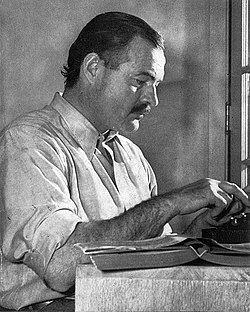Ernest Hemingway Quote
In the morning it was raining. A fog had come over the mountains from the sea. You could not see the tops of the mountains. The plateau was dull and gloomy, and the shapes of the trees and the houses were changed. I walked out beyond the town to look at the weather. The bad weather was coming over the mountains from the sea.The flags in the square hung wet form the with poles and the banners were wet and hung damp against the front of the houses, and in between the steady drizzle the rain came down and drove every one under the arcades and made pools of water in the square, and the streets were dark and deserted; yet the fiesta kept up without any pause. It was only driven under covers.The covered seats of the bull-ring had been crowded with people sitting out of the rain watching the concourse of Basque and Navarrais dancers and singers, and afterward the Val Carlos dancers in their costumes danced down the street in the rain, the drums sounding hallow and damp, and the chiefs of the bands riding ahead of their big, heavy-footed horse, their costumes wet, the horses’ coats wet in the rain. The crowd was in the cafés and the dancers came in, too, and sat, their tight-wound white legs under the tables, shaking the water from their belled caps, and spreading their red and purple jackets over the chairs to dry. It was raining hard outside.
In the morning it was raining. A fog had come over the mountains from the sea. You could not see the tops of the mountains. The plateau was dull and gloomy, and the shapes of the trees and the houses were changed. I walked out beyond the town to look at the weather. The bad weather was coming over the mountains from the sea.The flags in the square hung wet form the with poles and the banners were wet and hung damp against the front of the houses, and in between the steady drizzle the rain came down and drove every one under the arcades and made pools of water in the square, and the streets were dark and deserted; yet the fiesta kept up without any pause. It was only driven under covers.The covered seats of the bull-ring had been crowded with people sitting out of the rain watching the concourse of Basque and Navarrais dancers and singers, and afterward the Val Carlos dancers in their costumes danced down the street in the rain, the drums sounding hallow and damp, and the chiefs of the bands riding ahead of their big, heavy-footed horse, their costumes wet, the horses’ coats wet in the rain. The crowd was in the cafés and the dancers came in, too, and sat, their tight-wound white legs under the tables, shaking the water from their belled caps, and spreading their red and purple jackets over the chairs to dry. It was raining hard outside.
Related Quotes
About Ernest Hemingway
Hemingway was raised in Oak Park, Illinois, a suburb of Chicago. After high school, he spent six months as a reporter for The Kansas City Star before enlisting in the Red Cross. He served as an ambulance driver on the Italian Front in World War I and was seriously wounded by shrapnel in 1918. In 1921, Hemingway moved to Paris, where he worked as a foreign correspondent for the Toronto Star and was influenced by the modernist writers and artists of the "Lost Generation" expatriate community. His debut novel, The Sun Also Rises, was published in 1926. In 1928, Hemingway returned to the U.S., where he settled in Key West, Florida. His experiences during the war supplied material for his 1929 novel A Farewell to Arms.
In 1937, Hemingway went to Spain to cover the Spanish Civil War, which formed the basis for his 1940 novel For Whom the Bell Tolls, written in Havana, Cuba. During World War II, Hemingway was present with Allied troops as a journalist at the Normandy landings and the liberation of Paris. In 1952, his novel The Old Man and the Sea was published to considerable acclaim, and won the Pulitzer Prize for Fiction. On a 1954 trip to Africa, Hemingway was seriously injured in two successive plane crashes, leaving him in pain and ill health for much of the rest of his life. He committed suicide at his house in Ketchum, Idaho, in 1961.
